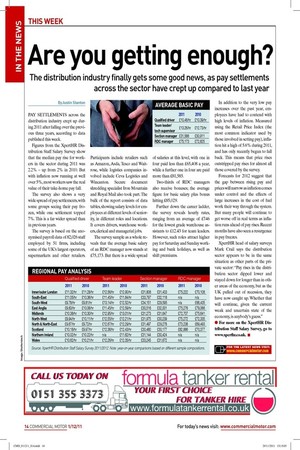Are you getting enough?
Page 10

If you've noticed an error in this article please click here to report it so we can fix it.
The distribution industry finally gets some good news, as pay settlements across the sector have crept up compared to last year
ByJustin Stanton
PAY SETTLEMENTS across the distribution industry crept up during 2011 after falling over the previous three years, according to data published this week.
Figures from the XpertHR Distribution Staff Salary Survey show that the median pay rise for workers in the sector during 2011 was 2.2% – up from 2% in 2010. But with inlation now running at well over 5%, most workers saw the real value of their take-home pay fall.
The survey also shows a very wide spread of pay settlements, with some groups seeing their pay frozen, while one settlement topped 7%. This is a far wider spread than in previous years.
The survey is based on the anonymised payroll data of 82,026 staff employed by 51 irms, including some of the UK’s largest operators, supermarkets and other retailers. Participants include retailers such as Amazon, Asda, Tesco and Waitrose, while logistics companies involved include Ceva Logistics and Wincanton. Secure document shredding specialist Iron Mountain and Royal Mail also took part. The bulk of the report consists of data tables, showing salary levels for employees at different levels of seniority, in different roles and locations. It covers drivers, warehouse workers, clerical and managerial jobs.
The survey sample as a whole reveals that the average basic salary of an RDC manager now stands at £75,173. But there is a wide spread of salaries at this level, with one in four paid less than £65,408 a year, while a further one in four are paid more than £81,585.
Two-thirds of RDC managers also receive bonuses; the average igure for basic salary plus bonus hitting £85,029.
Further down the career ladder, the survey reveals hourly rates, ranging from an average of £7.46 for the lowest grade warehouse assistants to £12.43 for team leaders. However, such roles attract higher pay for Saturday and Sunday working and bank holidays, as well as shift premiums. In addition to the very low pay increases over the past year, employees have had to contend with high levels of inlation. Measured using the Retail Price Index (the most common indicator used by those involved in setting pay), inlation hit a high of 5.6% during 2011, and has only recently begun to fall back. This means that price rises outstripped pay rises for almost all those covered by the survey.
Forecasts for 2012 suggest that the gap between rising pay and prices will narrow as inlation comes under control and the effects of large increases in the cost of fuel work their way through the system. But many people will continue to get worse off in real terms as inlation runs ahead of pay rises. Recent months have also seen a resurgence in pay freezes.
XpertHR head of salary surveys Mark Crail says the distribution sector appears to be in the same situation as other parts of the private sector: “Pay rises in the distribution sector dipped lower and stayed down for longer than in other areas of the economy, but as the UK pulled out of recession, they have now caught up. Whether that will continue, given the current weak and uncertain state of the economy, is anybody’s guess.”
• For more on the XpertHR Distribution Staff Salary Survey, go to www.xperthr.co.uk. ■











































